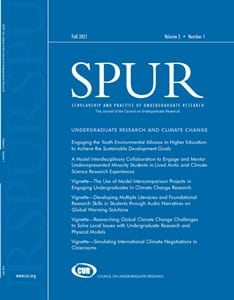SPUR (2021) 5 (1): https://doi.org/10.18833/spur/5/1/3
More Articles in this Issue
- Vignette‐ Laura Guertin, Annie Jansen, and James Berkey
SPUR (2021) 5 (1): https://doi.org/10.18833/spur/5/1/5 - Practice‐ Sarah Whipple, Shardul Tiwari, Tashiana C. Osborne, Gillian Bowser, Sarah A. Green, Pamela H. Templer, and Susie S. Ho
SPUR (2021) 5 (1): https://doi.org/10.18833/spur/5/1/1 Abstract:The authors present a new approach to show how interdisciplinary collaborations among a group of institutions can provide a unique opportunity for students to engage across the science-policy nexus using the framework of the Sustainable Development Goals and the United Nations Framework Convention on Climate Change. Through collaboration across seven higher education institutions in the United States and Australia, virtual student research teams worked together across disciplines such as economics, ecology, and other earth and social sciences to address research questions centered on sustainable development goals. The teams presented their findings in person to diplomats and delegates at the 2019 United Nations Conference of the Parties meeting in Madrid, which also had strong qualitative impacts on their perceptions of international science-policy interfaces.
- Article‐ Jennifer A. Hamel, Hannah M. ter Hofstede, Adrienne Gauthier, David Lopatto, Prudence Merton, and David Vandermast
SPUR (2021) 5 (1): https://doi.org/10.18833/spur/5/1/11 Abstract:Few studies have investigated the effects of combining undergraduate research with study abroad. The authors present student self-reported learning gains from two undergraduate courses that embed research within study abroad courses. Students in one course worked in small groups on original research projects; students in the second course collectively contributed to one ongoing, professional research project. Student learning was evaluated through focus groups, reflective journaling, and surveys. Students from both courses reported gains unique to research in an international context, including curiosity inspired by novel environments and valuing local knowledge for site-specific questions. Differences in student learning between courses raise questions about the relationship of course structures to high-impact practices and their potential to affect learning in opposing or synergistic ways.
- Article‐ Miloš Savic, Naga Rama Kothapalli, Hayley C. Lanier, Erin K. Freeman, Lisa Ratliff, Emma Hillermann, and Courtney Martin
SPUR (2021) 5 (1): https://doi.org/10.18833/spur/5/1/10 Abstract:One of the most important actions in research and mentoring is to adjust expectations and provide emotional support when unexpected events occur. In this article, the authors investigate the impacts of COVID-19-based campus closures on undergraduate research and the student and faculty impressions of the adjustment. Through interviews with 28 students and 17 mentors from a campus-wide undergraduate research program, common themes in the responses to COVID-related impacts were found. Students had to adjust to the type or scope of their research obligations while handling academic responsibilities, and mentors explicitly considered students’ wellbeing above expectations related to research. Providing professional development to mentors that emphasizes flexibility and compassion in the mentor-student relationship is recommended.
- Perspectives‐ Nicholas Grindle, Stefanie Anyadi, Amanda Cain, Alastair McClelland, Paul Northrop, Rebecca Payne, and Sara Wingate Gray
SPUR (2021) 5 (1): https://doi.org/10.18833/spur/5/1/12 Abstract:In recent years, advocates for research-based education have publicized many examples of passive research involvement, defined as undergraduates learning about the content and lived experience of research at their institution. But the qualitative dimensions of passive research involvement remain unknown. The authors’ study uses Diana Laurillard’s “conversational framework” to analyze reports from 367 undergraduate students at a UK research intensive university who met researchers and learned about their work. The results show a range of experiences in student learning about faculty research. These findings make the case that passive research involvement has its own integrity and cannot be characterized as an absence of participation. The authors suggest ways that the students as audience category can enhance undergraduate connections with research
- Open-to-Read‐ Arnell Garrett, Frances D. Carter-Johnson, Susan M. Natali, John D. Schade, and Robert Max Holmes
SPUR (2021) 5 (1): https://doi.org/10.18833/spur/5/1/4 Abstract:The Polaris Project, a National Science Foundation–funded program at the Woodwell Climate Research Center, aims to comprehensively address minority participation in climate and Arctic science research. The project implemented design principles to recruit, motivate, and retain African Americans, Hispanics, Native Americans or Alaskan Natives, and women through immersive, field research experiences. The project included undergraduate and graduate students from environmental science, ecology, hydrology, biology, forestry, and geology. Ninety-five percent of participants identified as African American, Hispanic, Native American or Alaskan Native, and/or female. Critical participant outcomes included development of interdisciplinary research projects, involvement in self-efficacy and advocacy experiences, and increased awareness and discussion of Arctic research careers. All outcomes contributed to the Polaris Project’s role as a model climate science research program.


